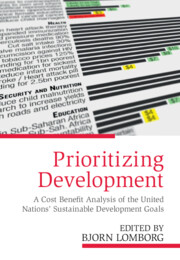 Prioritizing Development
Prioritizing Development Published online by Cambridge University Press: 30 May 2018
Summary
Guy Hutton's chapter is part of a series of publications from the WHO and World Bank that suggest the benefits of water and sanitation interventions in developing countries are an order of magnitude or more higher than the costs of improved services. However, I challenge this finding on a number of grounds, particularly related to the assumptions made in the economic analysis.
The benefit-cost analysis rests on two assumptions, that each person's well-being is to count, and count according to their own valuation, and that this is also the valuation placed on the change by society. The challenge is to learn about individuals’ preferences and measure the strength of these in monetary terms, either via the willingness to pay (WTP) for the outcome or the willingness to accept (WTA) compensation to forego the change.
Some experts are reluctant to measure benefits in terms of expressed preferences because they believe that people do not fully understand either the benefit or the causal relationship between hygiene and health. They are thus inclined to substitute their own assessment of the benefits into the benefit-cost calculation, which creates a challenge for BCA. In simple terms, if the benefit-cost ratio of a WASH intervention is 10:1, or even 20:1 as suggested in the chapter, why don't individuals rush to adopt these interventions?
The reasonableness of the benefit estimate depends largely on the accuracy of the estimates of time saving, which is what delivers the greatest benefit. Consider one of the sources of time savings – not walking to an open defecation site. If we assume a rural household of two adults and three children, the monthly benefits estimated in the chapter would be about US$5 per month, but would everyone actually change their behavior? In practice, in rural India, there is evidence that many people prefer to practice open defecation, which means that the benefit in the chapter must be considered highly speculative and subject to a high level of uncertainty.
A similar argument applies to the benefits of avoided mortality. The human capital approach has no theoretical justification; a WTP figure would give a much lower benefit, particularly in poor communities, but some experts are uncomfortable with this. The substitution of expert judgment gives the appearance of greater certainty in the benefit estimates and, in many situations, inflates the economic benefits.
To save this book to your Kindle, first ensure [email protected] is added to your Approved Personal Document E-mail List under your Personal Document Settings on the Manage Your Content and Devices page of your Amazon account. Then enter the ‘name’ part of your Kindle email address below. Find out more about saving to your Kindle.
Note you can select to save to either the @free.kindle.com or @kindle.com variations. ‘@free.kindle.com’ emails are free but can only be saved to your device when it is connected to wi-fi. ‘@kindle.com’ emails can be delivered even when you are not connected to wi-fi, but note that service fees apply.
Find out more about the Kindle Personal Document Service.
To save content items to your account, please confirm that you agree to abide by our usage policies. If this is the first time you use this feature, you will be asked to authorise Cambridge Core to connect with your account. Find out more about saving content to Dropbox.
To save content items to your account, please confirm that you agree to abide by our usage policies. If this is the first time you use this feature, you will be asked to authorise Cambridge Core to connect with your account. Find out more about saving content to Google Drive.